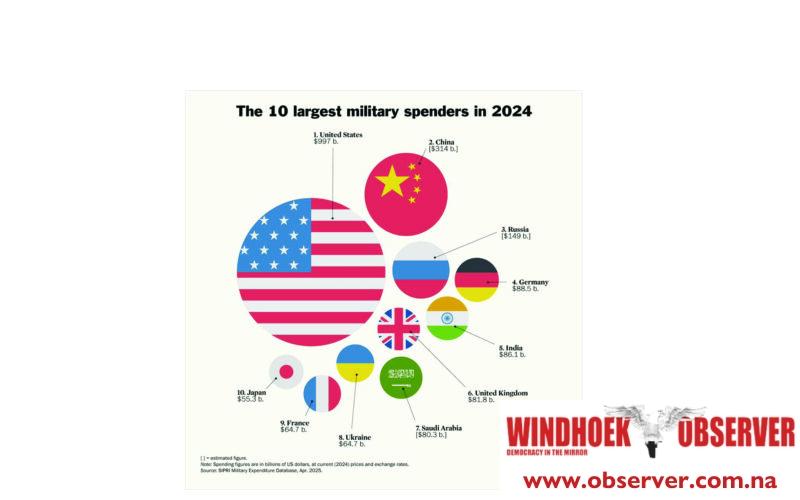Justicia Shipena
Africa accounts for less than 2% of worldwide military expenditure even as global spending surged to a record $2.7 trillion in 2024, a new United Nations (UN) report shows. This is despite being home to nearly 20% of the world’s population and about a quarter of UN member states.
Launching The Security We Need: Rebalancing Military Spending for a Sustainable and Peaceful Future on Tuesday, UN secretary general António Guterres warned that excessive military spending does not guarantee peace.
“It often undermines it, fueling arms races, deepening mistrust and diverting resources from the very foundations of stability,” he said.
He urged governments to shift resources from war to development.
The report argues the continent’s security would be better served by channeling scarce public funds into jobs, education, health, water and sanitation, climate resilience, and inclusive governance.
The report notes that in 2024, the world spent the equivalent of $334 per person on militaries.
Military outlays rose to 2.5% of global GDP and 7.1% of government budgets, with more than 100 countries increasing defence allocations last year.
If current trends continue, the UN said spending could reach $3.5 trillion by 2030 and as high as $6.6 trillion by 2035.
At the same time, progress on the Sustainable Development Goals (SDG) is faltering.
Only one in five targets is on track, while the SDG financing gap is already $4 trillion a year and could widen to $6.4 trillion.
“Budgets are choices. Redirecting even a fraction of today’s military spending could close vital gaps, putting children in school, strengthening primary health care, expanding clean energy and resilient infrastructure, and protecting the most vulnerable,” Guterres said.
Guterres urged practical steps to rebalance spending: put diplomacy first, ensure transparency and accountability in defence budgets, and boost development financing.
“A more secure world begins by investing at least as much in fighting poverty as we do in fighting wars,” he said.
UN disarmament chief Izumi Nakamitsu called for a “human-centred” security vision “that safeguards people, not just borders,” adding that rebalancing global priorities is not optional.
Warning on diverting funds from social priorities
The report also highlights the trade-offs.
Ending global hunger by 2030 would cost about $93 billion a year, less than 4% of 2024 military spending.
According to the report, fully vaccinating every child would require between $100 and $285 billion, about 10% of annual military outlays at the high end.
Basic healthcare in low- and lower-middle-income countries could be provided for $370 billion a year, or 14% of 2024 spending.
Meanwhile, safe drinking water and sanitation in 140 low- and middle-income countries would cost $114 billion per year, under 5%.
Funding 12 years of quality schooling for every child in those countries would take $5 trillion, less than a quarter of what was spent on militaries over the past decade.
Climate adaptation in developing countries could be fully covered by reinvesting 15% of global military spending, about $387 billion.
The report also warns of macroeconomic risks. Higher defence bills can slow growth and drive public debt, constraining future development.
In low- and middle-income countries, a 1% rise in military expenditure is linked to an almost equal reduction in publicly financed health services, weakening pandemic readiness.
While defence industries create employment, other sectors generate more jobs per dollar.
The report, requested under the Pact for the Future adopted at the Summit of the Future, stresses that rising arms budgets undermine the UN Charter’s purpose, including Article 26’s call to maintain peace.
It recommends bringing military expenditure into disarmament forums, linking arms control and development, reinvigorating multilateral development finance, and adopting a human-centred security approach that prioritises people and planet.
Acting UNDP administrator Haoliang Xu added the world is at a time where fissures are deepening, official development assistance is falling, and human development progress is slowing.
However, Xu said development is a driver of security and multilateral development cooperation works.
“When people’s lives improve, when they have access to education, healthcare, economic opportunities and when they can live lives of dignity and self-determination, we will have more peaceful societies and a more peaceful world.”




